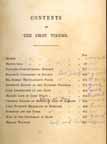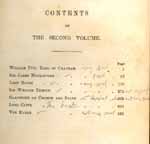[Note: This essay first appeared in Notes and Queries (2001)].

Trollope's bookplate; click on image for larger picture. [Not in print version]
Some three decades ago Ernest Chew, Associate Professor of History at the National University of Singapore, purchased in a Cambridge bookstore Anthony Trollope's copy of Thomas Babington Macaulay's Critical and Historical Essays Contributed to the Edinburgh Review, which Longman, Green, Longman, Roberts, & Green published in three volumes (1867). Each of the three volumes of Trollope's own copy of these essays contains the novelist's bookplate and two kinds of annotation in pencil: comments in the margins of individual essays and summary judgements of each of Macaulay's essays on the contents page of each volume.
A comparison of these annotations with samples of Trollope's handwriting reproduced in John Hall's 1983 edition of the novelist's letters confirms that the annotations are in fact by Trollope himself. Certain words, such as 'which', are identical in appearance to the photographs of the same words in the edited correspondence.
As Trollope's correspondence reveals, for him Macaulay represented two important facts or qualities about authorship. First, Macaulay exemplified the professional author with relatively high standards. As Trollope remarked in a letter of August 1883, the essayist and historian wrote as a professional author: 'Shakespeare did his work for money, quite unconscious of its abnormal excellence. Macaulay & Carlyle have been very careful to write for money, & Tennyson is as careful to do so as any one. What is needed in writing, as in other work, is honesty; — honesty to see the work given is as good as can be sent out' (Letters, II, 597).
Second, and as perhaps a corollary of his first point, Trollope took Macaulay to exemplify the fact that to acquire and retain an audience, one had to be entertaining. Indeed, as he wrote to G. S. Rusden in April 1879:
An historian is bound to be true. Who can say otherwise? But amongst historians who so often read as Macaulay, — who is inaccurate, but whose style is charming? What so readable as Herodotus, who tells us tales? What so unreadable as Allison who tells us facts? Men now very seldom are laborious readers. You must charm or you have no chance. [Letters, II, 826]
Earlier he had written along somewhat similar lines to the same correspondent:
You speak of the habit of keeping your mind open till your evidence is complete, — without which no one perhaps ought to attempt to be an historian. Yet see how men have succeeded who have no power of doing so, Herodotus for instance and Livy, — of whom you will not think much as having written before the age of evidence; but of Macaulay and Froude, who, considering their age, are as inexact, you will think a great deal. But they have made themselves masters of a certain historical purpose, and, though so often wrong in detail, have a left a picture of their periods which the world of readers has acknowledged to be true. [Letters, II, 790-91].
A few of Trollope's marginal notations apparently record his disapproval of Macaulay's inaccuracies. On one page his sparse marginalia take the form of simple question marks: in 'Earl of Chatham' he underlines the phrase 'He was poor' and places a question mark in the margin, and later, on the same page he underlines 'St Maloes' and again pencils a question mark. At other times he writes out his praise and censure. For example, at the close of the essay on Milton, Trollope wrote in the bottom margin, 'The enthusiasm of a young man which even becomes exaggeration' (I, 58), and within the essay itself he pencils in (perpendicular to the margin) 'greatly exaggerated' next to the following paragraph:
His public conduct was such as was to be expected of a man of spirit so high and of an intellect so powerful. He lived at one of the most memorable eras in the history of mankind, at the very crisis of the great conflict between Oromasades and Arimanes, liberty and despotism, reason and prejudice. That great battle was fought for no single generation, for no single land. The destinies of the human race were stakes on the same cast with the freedom of the English people. Then were first proclaimed those mighty principles which have since worked their way into the depths of the American forest, which have roused Greece from the slavery and degeneration of two thousand years, and which, from one end of Europe to the other, have kindled an unquenchable fire in the hearts of the oppressed, and loosed the knees of the oppressors with unwonted fear. ['Milton', I, 29]
In contrast, some of Trollope's other annotations obviously indicate his approval of the essayist's points. Thus, at the top of the contents page for volume III, Trollope wrote, 'p. 342: Shakespeare & Jane Austen. But one should read from p. 338 to bottom of p 343'. The first passage to which Trollope refers contains Macaulay's praise of Shakespeare and Austen. On the previous page one finds the beginning of the passage containing his praise of Shakespeare's approach to creating characters: 'Highest among those who have exhibited human character by means of dialogue, stands Shakespeare. His variety is like the variety of nature, endless diversity, scarcely any monstrosity' (III, 341). According to Macaulay, who is here arguing against 'the silly notion that every man has one ruling passion', Shakespeare's characters have complex natures, as do those of Jane Austen, whom he judges to be 'among the writers who, in the point we have noticed, have approached nearest to the great master'.
Jane Austen, a woman of whom England is justly proud . . . has given us a multitude of characters, all, in a certain sense, commonplace, all such as we meet every day. Yet they are all as perfectly discriminated from each other as if they were the most eccentric of human beings . . . . Not one of them has any hobbyhorse, to use the phrase of Sterne. Not one of them has a ruling passion, such as we read of in Pope. [III, 342]
Other marginalia appear to indicate interest or approval, such as when he simply places a line in the margin perpendicular to the text — as Trollope has done next to the following sentences critical of lawyers: 'We will not at present enquire . . . whether it be right that a man should, with a wig on his head, and a band round his neck, do for a guinea what, without these appendages, he would think it wicked and infamous to do for an empire; whether it be right that, not merely believing but knowing a statement to be true, he should do all that can be done by sophistry, by rhetoric, . . . [to cause a jury to think that statement false]' (II, 164).
Similarly, in Macaulay's essay 'Lord Bacon', which a notation on the contents page tells us that Trollope believed to be 'very good', he puts a line in the margin next to 'His faults were — we write it with pain — coldness of heart, and meanness of spirit' (II, 168).
In contrast, other marginalia indicate strong disagreement. Next to the following remark about the relation of science and poetry, Trollope pencils an X: 'the discoveries of modern astronomers and anatomists have really added nothing to the force of that argument which a reflecting mind finds in every beast, bird, insect, fish, leaf, flower, and shell' (II, 541). In the bottom margin appears the following pencilled comment: 'They have added something to the reasoning power of the minds which are subject to the evidences which do exist.'
In a few cases the marginalia are ambiguous. It is not clear, for example, whether Trollope agrees or disagrees with the first sentence of 'Gladstone on Church and State', when he places three exclamation points, each at least half an inch high, next to the following characterisation of Gladstone: 'The author of this volume is a young man of unblemished character, and distinguished parliamentary talents, the rising hope of those stern band of unbending Tories' (II, 374). His three exclamation points might denote agreement, incredulity, or simply the fact that by the time Trollope read this copy of Macaulay's essay on Gladstone, the man had moved far from his early Toryism to advocating a great expansion of the electoral franchise, a position espoused by radicals and democrats.
Contents pages for each volume of Trollope's copy of Macaulay's essays. Click on images for larger pictures. [Not in print version]



Most of Trollope's judgements of Macaulay, however, appear on the contents page of each of the three volumes. Since his pencilled annotations are self-explanatory, we shall close simply by transcribing them; the title of each essay (in bold) is followed, in quotation marks, by Trollope's comments in pencil:
[Volume I]
Milton 'exaggerated'
Machiavelli 'good,'
Hallam's Constitutional History 'inferior'
Southey's Colloquies on Society 'last part very good'
Mr. Robert Montgomery's Poems 'too severe'
Southey's Edition of the Pilgrim's Progress 'good'
Civil Disabilities of the Jews 'good'
Croker's Edition of Boswell's Life of Johnson 'Whig v Tory but very good'
Lord Nugent's Memorials of Hampden 'excellent'
Burleigh and His Times 'good'
War of the Succession in Spain 'good'
Horace Walpole 'half good half inefficient'
[Volume II]
William Pitt, Earl of Chatham 'very good'
Sir James Macintosh 'good'
Lord Bacon 'very good'
Sir William Temple 'not so good'
Gladstone on Church and State 'topical, but not so good'
Lord Clive 'The best — '
Von Ranke 'not very good'
[Volume III]
Leigh Hunt 'good'
Lord Holland 'graceful'
Warren Hastings 'very good indeed but tainted towards the end by inflated passages in which attempts at over-ornamentation have been made.'
Frederic the Great 'very good'
Madame D'Arblay 'first half good'
Life and Writings of Addison 'good but exaggerated'
The Earl of Chatham 'excellent'
References
Macaulay, Thomas Babington. Critical and Historical Essays Contributed to the Edinburgh Review. London: Longman, Green, Longman, Roberts, & Green, 1867.
Trollope, Anthony. The Letters. Ed. N. John Hall with Nina Burgis. 2 vols. Stanford: Stanford UP, 1983.
Last modified 9 July 2004